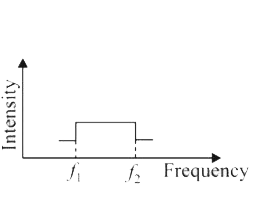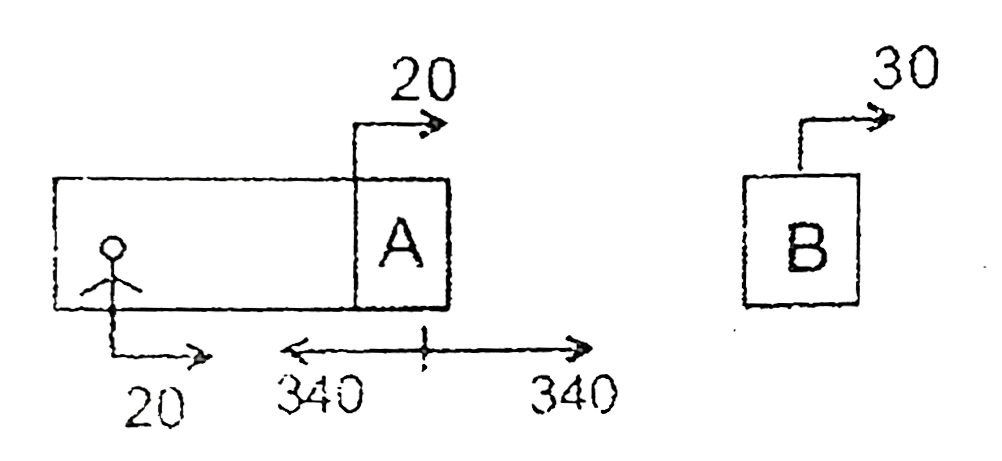Two trains A and B are moving with speeds 20 m/s and 30 m/s, respectively in the same direction on the same straight track with B ahead of A. The engines are at the front ends. The engine of train A blows a long whistle. Assume that the sound of the whistle is composed of components varying in frequency from f1=800Hz to f2=1120Hz, as shown in the figure. the spread in the frequency (highest frequency-lowest frequency) is thus 320Hz. the speed of sound in still air is 340 m/s.

Q. The distribution of the sound intensity of the whistle as observed by the passengers in train A is best represented by :
_E01_203_O01.png)
_E01_203_O02.png)
_E01_203_O03.png)
_E01_203_O04.png)
The correct Answer is:A
For the passengers in train A, there is no relative motion between source and observer, as both are moving with velocity 20 m/s. Therefore, there is no change in observed frequencies and correspondingly there is no change in their intensities.
Topper's Solved these Questions
Similar Questions
Two trains AandB moving with speeds 20m/s and 30m/s respectively in the same direction on the same straight track, with B ahead of A. The engines are at the front ends. The engine of train A blows a long whistle.
Assume that the sound of the whistle is composed of components varying in frequency from f1=800Hz to f2=1120Hz, as shown in the figure. the spread in the frequency (highest frequency - lowest frequency) is thus 320Hz. the speed of sound in still air is 340m/s.
(5) The distribution of the sound intensity of the whistle as observed by the passengers in train A is best represented by
View SolutionTwo trains AandB moving with speeds 20m/s and 30m/s respectively in the same direction on the same straight track, with B ahead of A. The engines are at the front ends. The engine of train A blows a long whistle.
Assume that the sound of the whistle is composed of components varying in frequency from f1=800Hz to f2=1120Hz, as shown in the figure. The spread in the frequency (highest frequency - lowest frequency) is thus 320Hz. The speed of sound in still air is 340m/s.
The speed of sound of the whistle is
View SolutionTwo trains AandB moving with speeds 20m/s and 30m/s respectively in the same direction on the same straight track, with B ahead of A. The engines are at the front ends. The engine of train A blows a long whistle.
Assume that the sound of the whistle is composed of components varying in frequency from f1=800Hz to f2=1120Hz, as shown in the figure. The spread in the frequency (highest frequency - lowest frequency) is thus 320Hz. The speed of sound in still air is 340m/s.
(4) The speed of sound of the whistle is
View SolutionTwo trains AandB moving with speeds 20m/s and 30m/s respectively in the same direction on the same straight track, with B ahead of A. The engines are at the front ends. The engine of train A blows a long whistle.
Assume that the sound of the whistle is composed of components varying in frequency from f1=800Hz to f2=1120Hz, as shown in the figure. the spread in the frequency (highest frequency - lowest frequency) is thus 320Hz. the speed of sound in still air is 340m/s.
The spread of frequency as observed by the passenger in train B is
View SolutionTwo trains A and B are moving with speeds 20m/s respectively in the same direction on the same stright track, with B ahead of A. The engines are at the front ends. The engines of train A blows a long whistle.
Assume that the sound of the whistle is composed of components varying in frequency from f1=800Hz to f2=1120Hz, as shown in figure. The speed in the frequency (highest frequency - lowest frequency) is thus 320Hz. The speed of sound in still air is 340m/s.

The spread of frequency as observed by the passengers in train B is
View SolutionA railroad train is travelling at 30.0 m/s in still air. The frequency of the note emitted by the train whistle is 262 Hz. Speed of sound in air is 340 m/s.
View SolutionThe engine of a train sound a whistle at frequency v, the frequency heard by a passenger is
View SolutionTwo trains A and B are moving in the same direction with velocities 30 m/s and 10 m/s respectively, B is behind from A, blows a horn of frequency 450 Hz. Then the apparent frequency heard by B is (The velocity of sound is 330 m/s) :-
View SolutionThe engine of a train sound a whistle at frequency v, the frequency heard by a passenger is
View SolutionA man standing on a platform observes that the frequency of the sound of a whistle emitted by a train drops by 140 Hz. If the velocity of sound in air is 330 m/s and the speed of the train is 70 m/s, the frequency of the whistle is
View Solution
